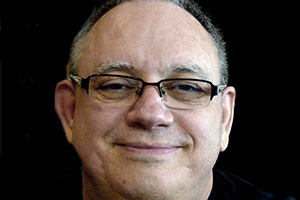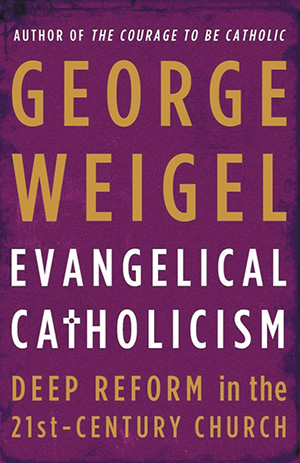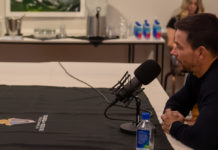I met George Weigel last year when he came to the Valley to speak about how the KGB tried to suborn John Paul II, if that were even possible. I told him that I read his book, “Against the Grain,” and it totally revolutionized my view of Just War Theory. He seemed surprised that someone had actually read, and, understood a book of his.

I read another one that he released in 2013 (our review schedule is full, but I insisted anyway), “Evangelical Catholicism,” and decided that this one simply blew me away, as the old cliché goes.
Considering the existence of evangelicalism among Protestants, the title of the book is an unfortunate necessity and it will put some Catholics off; the truth is that Weigel could not have titled it anything else. Let’s make the distinction now so that when you all rush out and read the book, there won’t be any confusion.

Evangelicalism is a Protestant movement covering many denominations. The root of the word is evangelion, a Greek word meaning “good news” or “gospel.” The movement is associated with various revivals and a strong presence in the Religious Right in American politics.
Evangelical Catholicism is simply a pathway from Counter-Reformation Catholicism back to the dynamics and vibrancy of the Early Church. In other words, it is prophetic.
Weigel’s reasoning for this approach is sound — he writes that the purpose of Evangelical Catholicism is to directly counter the postmodern milieu in which we, as a people and a Church, find ourselves mired.
Before you stop reading this review because of its reference to something so unglamorous as “postmodernism,” consider these questions: does the 21st century feel right to you? Does the abortion rate (55 million and counting) bother you? Does the lack of civility in politics test your patience? Does the fact that 51 percent of Catholics believe that abortion is OK (PEW, Feb. 25, 2013), that 37 percent of Catholics don’t believe in the Real Presence (Catholic University, 2011), or that 35 percent of all Catholics are non-practicing (Marist College, 2013) seem like the proper trend for building God’s kingdom on Earth? If you answered “no” to the first question, then Weigel’s book will tell you what you need to know to reverse the trends. If you answered “yes,” then you need Weigel’s book more than you know.
We must deal with the high-brow word, “postmodernism,” what it means and why it is important. Many philosophers, intellectuals, and critics have various ideas on the when and where of postmodernism. Here is what I found: the earliest reference was 1870 in a Paris newspaper reviewing the artwork of an English portrait painter; they called him “post-modern.” The worldview began making its way through all of art, into architecture around the turn of the century, through literature in the 1940s and 1950s, sprang into open warfare in politics and public culture in the 1960s, and then into theology in the 1970s, 1980s and 1990s until it now profoundly affects all aspects of our lives.
The two main operators of postmodernism are relativism and secularism. We’ve all heard these terms before: relativism means that all values are relative to their culture so that no true, universal values can exist. See the problem? Secularism means take prayer out of school, try to remove the word God from public life, and limit our worship to the inside of a church building.
Weigel points out that we’ve operated in a Counter-Reformation Catholicism for some time now, centered on catechesis and devotion, a focus on “rules” and rubrics for liturgy and everything else in the Church. Now, Weigel wants to fully manifest the gifts of Vatican II and bring the Church up firmly against the world in a way pleasing to God.
The first characteristic of Evangelical Catholicism is friendship with Christ. Friendship is a love that is steady and abiding. EC is Bible-centered; no more just a reading at the Mass but a deep, concerted effort to learn what the words mean for our lives. Divine revelation is the authority that we embrace, the Church is ordered to respect many vocations, the seven sacraments are the means to sanctify our lives, and there is a constant, active call to conversion of life. EC is counter-cultural and culture forming; it enters the public square with the voice of reason, and it awaits the coming of Christ.
If all of this sounds a little like Pope Francis, there it is. Both this book and what the Pontiff is doing will set us on the right path in these dark times.






